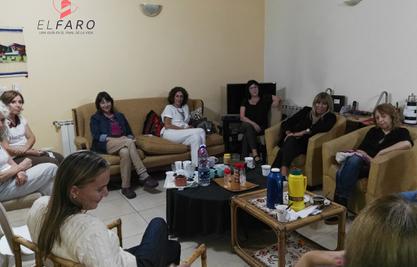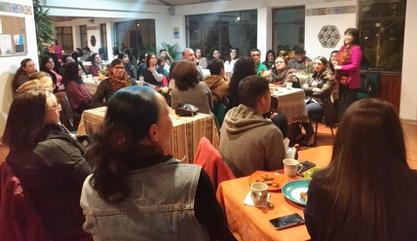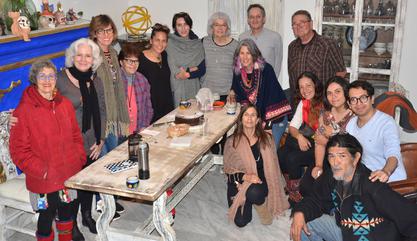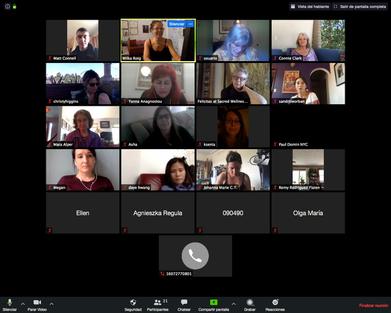Death Café flourishes in Latin America: a brief history
 Posted by
Wilka Roig
Posted by
Wilka Roig
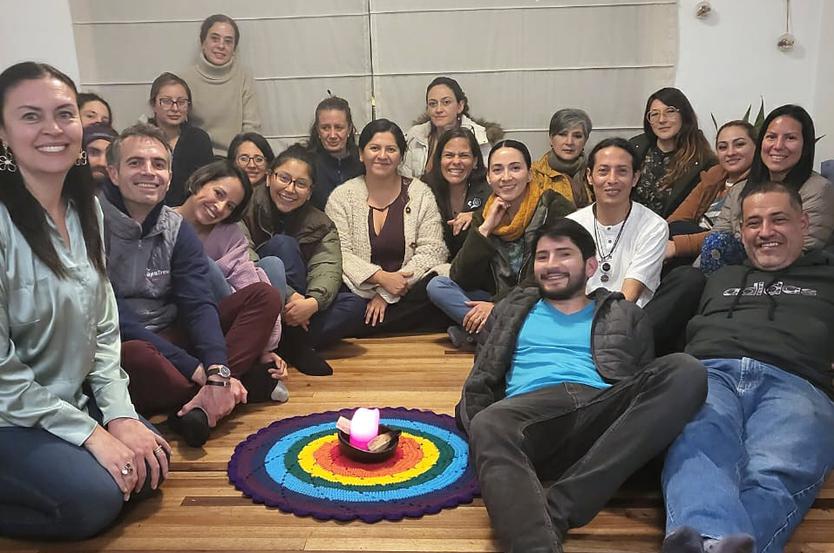
In September 2014 in Buenos Aires, Argentina, El Faro Asociación, under the direction of Viviana Bilezker, held the first Death Cafe in Latin America. Expectant and somewhat nervous about how it would turn out, members of the El Faro team received 30 people. After giving the guidelines, a tense silence was generated until a participant commented: “Today is a good day to talk about death because Gustavo Cerati—an Argentine musician who had been in a vegetative state for four years—died this week.” From there everything flowed. In 2015, the first Death Cafe in México was held independently in Mexico City, and six Death Cafes were held that year, facilitated by Luisa Ruiz. In Chile, the first Death Cafe was held in November 2016, organized by Jorge Browne and Matías Reeves from Proyecto Mokita, bringing together ten people who were strangers to each other in a powerful event that had regional impact. The first time that a Death Cafe was held in Ecuador, promoted by the El Faro Association during a visit to Quito, was also in November 2016, with the purpose of opening a space for the community where the topic of death can be discussed. The participating group was around 12 people, including men and women, all adults between 35 and 70 years old. By 2018, several recurring Death Cafes were established in México, in San Miguel de Allende and Querétaro facilitated by Wilka Roig, and in Ajijic, Guadalajara, Irapuato, Morelia, Zamora, Lázaro Cárdenas, Pátzcuaro, Huetamo and Uruapan by several individuals. These were held in private spaces, homes, community centers, cafes and restaurants, some monthly and some sporadically, with Mexican and foreign participants from 16 to 86 years old, in Spanish and bilingual, and varied attendance. In Ecuador, the Death Cafes emerged from Life Urns, with Verónica Falconi as facilitator, in 2019, taking place in the countryside, as an activity of six hours in total, in which not only stories, feelings, thoughts and emotions are shared, but also lunch, creating a Pambamesa, a term that means "cotton table," or shared table, in which each attendee brings something to share with the rest. Also in Ecuador, Death Cafes were held in a gallery of oriental carpets, where spiced tea was offered to drink and share with the people who arrived for the Death Cafe experience. With an invitation once a month, a space continues to be held for this activity. Also in 2019, the Death Cafe facilitators in México began to organize as a group, and there were at the time 14 facilitators. Not all Death Cafes managed to establish themselves, as participation was not consistent. In San Miguel de Allende, Ajijic, and some towns in the state of Michoacán, Death Cafes continued and prospered. Until the beginning of the pandemic, El Faro Asociación held more than 50 Death Cafes, always in person, testing different schedules with varied results. In México, around 150 Death Cafes were held until then. In 2020 everything changed. Most Death Cafes ceased, with only several Death Cafes continuing online. With the pandemic and its confinement, essential human needs were awakened by a reality that forced us to stare our mortality in the face, together with a collective spirit of undeniable uncertainty and vulnerability. In March 2020, Wilka Roig, facilitating from San Miguel de Allende, moved her Death Cafes online, and from once a month to once a week. Between March 2020 and May 2021, she facilitated 56 Death Cafes, which became international Death Cafes with an average attendance of 15 to 20 people, mostly women. During that time she also launched the green burial movement for ecological restoration in Mexico, which was born of the crisis of disposal of remains that became evident with the pandemic, and which was a recurring topic shared at Death Cafes. This movement bore fruit in May 2022 with the first truly ecological burial in Latin America with Fundación Elisabeth Kübler-Ross México Centro, of which Wilka Roig is founder and president. And in July 2020, Sofia Plonsky of LiveDoula, unable to facilitate in-person meetings in Quito, Ecuador, began offering online events. That year she was able to hold several meetings, with an average attendance of 10 to 20 people, mostly women. In 2020 El Faro Asociación changed the format and the invitation, and moved their Death Cafes online as well. Since then El Faro has held a monthly Death Cafe. With these events we as a collective necessarily began to talk about death in everyday life, either because someone had died or was soon to die, and because the grieving in the midst of this global condition was definitely collective. We were left vulnerable in the face of life and with the only certainty that death touches us all. In 2022, México returned to facilitating Death Cafes in person. Fundación Elisabeth Kübler-Ross México Centro trained members of their volunteer team of Life, Death and Transition Doulas to facilitate Death Cafes, and in-person Death Cafes began to be facilitated in the cities of Tequisquiapan, Playa del Carmen, San Miguel de Allende, and Guadalajara. Today, Death Cafes are facilitated monthly in each of these cities, in addition to being facilitated online in Spanish and English, also monthly. In June 2022, the first End-of-Life Doulas and activists in the movement to evolve the death culture in Latin America—Sofia Plonski from Ecuador, Wilka Roig from Mexico, Catalina Mahecha Cruz from Colombia, Maria Ignacia Mac-Auliffe from Chile, Verónica Falconi and Michelle Puga, also from Ecuador, co-founded La Red Latinoamericana de Acompañamiento en la Muerte y el Duelo, an incredibly rich network of the Latin American community that supports what is happening in the fields of grief and end of life regionally, nationally and internationally. Its first gathering, in Quito, Ecuador, in April 2023 brought together pioneers of the movement, with the aim of connecting all those involved in this work through a variety of roles. Connecting through the intention to learn from each other and discover new ways to address the challenges we all face, together we advance this movement beyond our independent countries, to benefit everyone in Latin America on a collective level. During said gathering, several people with the aim of promoting the Death Cafe movement in Latin America and expanding it further in our region, collaborated so this beautiful idea arose of creating a group to share the different Death Cafes in each country, their progress and challenges, so that we can all be enriched by these contributions. And this is how Death Cafe Latinoamérica emerged. The emergence of the Death Cafe in Bogotá has its roots in said meeting, where the initiative to start them in the Colombian capital emerged. With the collaboration of thanatologist Mónica Giraldo, together with End of Life Doulas Andrea Amaya and Juliana Ruiz, collaborative spaces for mutual support were created, both in the co-facilitation of meetings and in the support of individual initiatives. The starting point in Bogotá was May 2023. These spaces have diversified in modality and location, taking place in cafes, bookstores, galleries, and cultural centers, distributed in three different locations in the city, with participation of between 5 and 25 people at each meeting. In August 2023, Sofía Plonsky, Verónica Falconi, Sofía Plonski, Michelle Puga, and Wilka Roig, all co-founders of the Red Latinoamericana de Acompañamiento, united with Death Talk Cuenca in Cuenca, Ecuador, to facilitate the first Death Cafes in this city, both in Spanish, for the local community, and in English, for the expatriate community. These meetings have turned out to be very special and very well received, with an attendance of approximately 20 people each month, and in which we can see for the first time greater attendance of men, who have been 40% of the attendees. On November 14, 2023, the first Death Cafe in Guatemala was held in Guatemala City, facilitated by graduates of Fundación Elisabeth Kübler-Ross Mexico Centro, Diana Cervantes Center and Stephanie Erichsen. These continue monthly, and will also be held in Antigua Guatemala starting in January 2024. In 2024, El Faro plans to resume the in-person space, while still taking advantage of the benefits of gathering online, and will continue training members of its community in Buenos Aires and online, to support anyone who wants to facilitate Death Cafes. In 2024, Fundación Elisabeth Kübler-Ross Guatemala under the direction of Wendy Pineda will begin its series of monthly Death Cafes, also in Guatemala City. Our surprise in each country has been to see the enthusiasm and palpable need to share experiences and perspectives about death and the dying process. Death Cafes support us in continuing to discover and connect with our community and raise our collective awareness of death. In Argentina, the Death Cafe has functioned as a circle of belonging in which experiences have been shared between meetings, encouraging some to write their Advance Directives. In Mexico, the Death Cafe has helped expand perspectives and practice openness and inclusivity, understanding that each experience shows us one among countless possibilities in how human beings can experience their mortality and their grieving. In Ecuador, facilitating Death Cafes has helped open the door for more and more people to share and talk about death, fears, beliefs and feelings more openly. As we expand the message and objective of the Death Cafes in our region, we can highlight that this has been and continues to be a very beautiful path of learning from, exploring and sharing of experiences, and of sustaining and being sustained by very loving spaces. On the other hand, among the challenges we have faced is the questioning of the name of these spaces. Beyond explaining that it is the brand of a social franchise, putting the word “death” in the title generated confusion, even rejection, especially at first. On occasions we were contacted exclusively to criticize the "most god awful" name for any social gathering, and to share ill wishes for our endeavor. However, today we can see that people are opening up more, they are more receptive, and there is a slightly more accepted concept in general. Today people come to Death Cafes out of pure curiosity and with an interest in learning more. As we continue to reach our communities, the more the concept of Death Cafe expands in Latin America. It is also a challenge to face a religious belief system that has not influenced people to relate to their nature in the healthiest way, since death has become a taboo topic, treated and related to from a negative place of evasion, fear, and condemnation. Furthermore, another challenge has been, above all, the lack of knowledge of the brand as an international movement and its mission, which is why we have assumed many tasks, events, and approaches to inform about what it is, why its name, and what people will be able to find when they join. Once someone attends a Death Cafe, they do understand its value, and why Death Cafes are such a unique and beautiful space that can serve us all in so many essential ways. The emergence of Death Cafes across Latin America has significantly contributed to a change in the way people experience grief, allowing people to talk directly about death, helping immensely to break the taboo and discomfort that this topic often generates. We also observe that it manages to greatly alleviate the feeling of isolation that people experience in grief and in facing their own mortality. Connections are revealed in our human condition that also become community support, since by sharing experiences with others, participants find support and understanding. Death Cafes in Latin America are safe, welcoming spaces actively containing a range of perspectives on life, death and grief, where, through sharing experiences, participants learn to listen without judgment, to accompany without influencing or giving advice or opinions, while being exposed to practical, emotional, and intangible aspects related to death and grief. The Death Cafe is an axis of our work in our communities, bringing people together and adding to the co-creation of a culture that learns and evolves in relation to its ultimate destiny.

